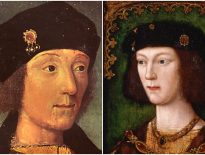On this day in Tudor history, 20th April 1534, Elizabeth Barton, a Benedictine nun who became known as “the Nun of Kent” or “the Holy Maid of Kent”, was hanged for treason at Tyburn along with a few of her supporters.
This young woman had experienced religious visions and people had even flocked to her on pilgrimages. All was well until her visions concerned Henry VIII, his quest for an annulment and his marriage to Anne Boleyn.
Also on this day in history:
- 1483 – Burial of Edward IV in St George's Chapel, Windsor Castle.
- 1523 – Death of Henry Clifford, 10th Baron Clifford, magnate. At around the age of sixty, Clifford led a force at the Battle of Flodden in 1513 against the Scots.
- 1534 – Prominent citizens of London were required to swear the “Oath of the Act of Succession”.
- 1578 – Death of Lady Mary Keys (née Grey), sister of Lady Jane Grey and wife of Thomas Keys, Sergeant Porter to Elizabeth I. Mary married Keys in secret in 1565, angering Elizabeth I. As a result, Keys was thrown into Fleet Prison and Mary was put into the care of Sir William Hawtrey at Chequers. Mary was later moved to the home of Katherine Willoughby, Duchess of Suffolk and her stepgrandmother, and then on to that of Sir Thomas Gresham. In 1568, Keys was released from prison, but he died in 1571 without ever being reconciled with Mary. Mary stayed with Gresham, voluntarily because she had nowhere else to go, until moving to her stepfather's house in 1573 and setting up her own home in London. She died at her home in London.
- 1584 – Execution of sixty year-old James Bell, Catholic priest and martyr, at Lancaster. Bell had been found guilty of being a Catholic recusant and celebrating the mass, and sentenced to death for high treason.
- 1587 - Burial of John Foxe, martyrologist, in St Giles, Cripplegate. He died 18th April at his home in Grub Street, in the same parish.



Thomas More was asked later on by Cromwell why he didn’t act against her, but More told him that he didn’t find anything heretical or bad in her and she also corresponded with Margaret Pole and others. Her public penance should have been enough, it would have been under the Catholic Kings. It was decided that she was a traitor. The fact was they didn’t like the truth and made the law to suit themselves.
I think her visions were genuine but open to interpretation and others put her opinion into the public realm. A number of people said the realm would suffer if Henry married Anne Boleyn. Perhaps it was just wishful thinking.
This is another person from good ole King Harry’s days I’m fascinated with. Thanks for sharing. Michelle t